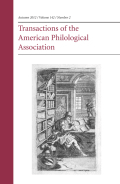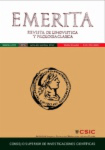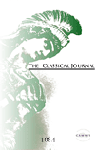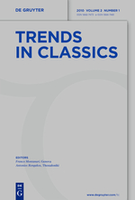
Boletim de Estudos Classicos
metrics 2024
Bridging Ancient Wisdom with Modern Learning
Introduction
Boletim de Estudos Clássicos is a distinguished scholarly journal dedicated to the field of Classics and Education, published by COIMBRA UNIV PRESS. Since its transition to an open-access format in 2013, the journal has aimed to broaden the accessibility of high-quality research and critical discussions within these disciplines. Despite its current categorizations in the Q4 quartile for both Classics and Education, the Boletim has a unique opportunity to serve as a platform for emerging voices and innovative research, fostering growth in an otherwise underrepresented area. Based in Portugal, the journal invites contributions that encompass a wide range of topics, from ancient texts and historical analysis to educational methodologies and pedagogy. With an ISSN of 0872-2110 and an E-ISSN of 2183-7260, the journal actively seeks to attract researchers, professionals, and students dedicated to the exploration of classical studies. The journal's address is RUA DA ILHA, NO 1, COIMBRA 3000-214, PORTUGAL, where its contributors and editorial board strive to inspire a deeper understanding of classical heritage and its relevance to contemporary education.
Metrics 2024
 0.10
0.10 0.10
0.10 0.10
0.10 0
0Metrics History
Rank 2024
Scopus
JCI (Web Of Science)
Quartile History
Similar Journals

MNEMOSYNE
Fostering critical discourse in the classics and beyond.MNEMOSYNE is a prestigious academic journal published by BRILL, specializing in the fields of Archeology, Classics, History, Linguistics and Language, and Literature and Literary Theory. With a remarkable history dating back to its inception in 1948, this journal continues to be a crucial resource for scholars and researchers, spanning its publication years that extend to 2024. The journal boasts high rankings in multiple categories according to Scopus, including Q1 status in Classics and History, reflecting its impact and relevance in the academic community. Although it is not an Open Access journal, its selection of peer-reviewed articles ensures rigorous scholarship that contributes to ongoing discussions and discoveries in the humanities. By providing a platform for innovative research and critical discourse, MNEMOSYNE plays an integral role in advancing the understanding of cultural and historical contexts, making it an essential read for both seasoned academics and emerging scholars alike.

ACME-Annali della Facolta di Studi Umanistici dell Universita degli Studi di Milano
Illuminating the complexities of literature, philosophy, and history.ACME-Annali della Facoltà di Studi Umanistici dell'Università degli Studi di Milano is a distinguished open-access journal, published by UNIV STUDI MILANO, that has been providing a platform for scholarly discourse in the humanities since 2014. With its ISSN 0001-494X and E-ISSN 2282-0035, this journal is dedicated to fostering critical analysis and innovative thought in areas such as literature, philosophy, history, and cultural studies. Situated in the heart of Milano, Italy, and addressing a global audience, ACME aims to promote interdisciplinary dialogue and contribute to the advancement of humanistic inquiry. By facilitating free access to high-quality research, the journal underscores the importance of disseminating knowledge to enable broader academic engagement. With an emphasis on rigor and relevance, ACME is an essential resource for researchers, professionals, and students seeking to deepen their understanding of the humanities.

PHOENIX-THE JOURNAL OF THE CLASSICAL ASSOCIATION OF CANADA
Illuminating the Path from Past to PresentPHOENIX - THE JOURNAL OF THE CLASSICAL ASSOCIATION OF CANADA is a distinguished academic journal published by the Classical Association of Canada, dedicated to advancing the study of classical antiquity and its enduring influence on contemporary society. With an ISSN of 0031-8299 and an E-ISSN of 1929-4883, PHOENIX serves as a pivotal platform for researchers, educators, and students in the field of classics. Although without open access provisions, the journal is noted for its rigorous peer-review process, ensuring the publication of high-quality scholarship that meets the academic community's standards. With its back issues archived since 2002, the journal is supported by a strong reputation, evidenced by its Scopus ranking in the 80th percentile in the Arts and Humanities - Classics category. Based in Toronto, Ontario, it continues to foster scholarly dialogue and exploration of themes ranging from ancient texts to contemporary interpretations of classical traditions. By prioritizing diverse contributions that enhance our understanding of classical studies, PHOENIX remains a vital resource for anyone engaged in the rich and varied exploration of the ancient world.

Minerva-Revista de Filologia Clasica
Illuminating the legacy of antiquity through research.Minerva-Revista de Filologia Clasica, an esteemed academic journal published by the Universidad de Valladolid, is a pivotal resource in the fields of Classics, Linguistics, and Literature. With its ISSN 0213-9634 and E-ISSN 2530-6480, this journal has been championing open access since 2017, making high-quality research accessible to a global audience. Based in Valladolid, Spain, Minerva is dedicated to the exploration and dissemination of scholarly work related to classical philology, offering a platform for the exchange of ideas among researchers, educators, and students alike. Recognized in the 2023 category quartiles as Q3 in Classics and Q4 in Linguistics and Language, this journal provides valuable insights and contributes significantly to its fields, allowing authors and readers to engage with important discussions and innovative perspectives. As the academic landscape evolves, Minerva continues to adapt, fostering a vibrant community committed to the advancement of knowledge in antiquity and its linguistic dimensions.

Transactions of the American Philological Association
Elevating Academic Dialogue in Literature and LinguisticsTransactions of the American Philological Association, published by Johns Hopkins University Press, is a leading academic journal dedicated to advancing the study of classics, linguistics, and literary theory. With an impressive impact factor solidified by its 2023 rankings—Q1 in Classics and Literature and Literary Theory, and Q2 in Linguistics and Language—this journal stands as a pivotal resource for scholars and practitioners in the humanities. The journal boasts a rich history of published research dating back to 2002, providing insights that address both contemporary and historical inquiries within its fields of study. Although it does not follow an Open Access model, its rigorous peer-review process ensures high-quality contributions that are essential for those engaged in advanced research. With an extensive reach, reflected in its robust Scopus rankings, Transactions of the American Philological Association plays an indispensable role in shaping the discourse for academics and students alike.

Emerita
Illuminating the Richness of Classical Studies and LinguisticsEmerita is a distinguished academic journal published by CONSEJO SUPERIOR INVESTIGACIONES CIENTIFICAS-CSIC in Spain, focusing on the fields of Classics and Linguistics. With its roots dating back to 1971, Emerita has established itself as an open-access publication since 1974, ensuring broad accessibility for researchers, professionals, and students alike. This journal's commitment to scholarly excellence is reflected in its 2023 Q2 classification in Classics and Q3 in Linguistics and Language, making it a vital resource for those engaged in classical studies and language research. In the Scopus rankings, it holds respectable standings, including Rank #76/170 in Arts and Humanities Classics and Rank #695/1088 in Language and Linguistics, demonstrating its significant presence and influence within these academic disciplines. The editorial office is located at Editorial CSIC, C/VITRUVIO 8, 28006 MADRID, SPAIN, where it continues to curate important research that contributes to the understanding and appreciation of classical literature and linguistic theory.

Antichthon
Nurturing a Passion for Classical ScholarshipAntichthon, published by Cambridge University Press, stands as a vital platform within the field of Classics. Established in 1986, the journal has evolved to encompass scholarly contributions that explore various dimensions of classical studies, including literature, history, and cultural studies. With its rich publication history extending from 2011 to 2023, Antichthon boasts a commendable Q2 ranking in the latest 2023 Category Quartiles for Classics, reflecting its significant impact in the academic community. Although the journal does not offer an Open Access option, it continues to engage researchers and academics with its curated selection of articles, reviews, and critical insights. Located at the Edinburgh Building, Shaftesbury Rd, Cambridge, England, this journal remains an essential resource for both established scholars and students aiming to deepen their understanding of classical antiquity and its enduring relevance.

CLASSICAL JOURNAL
Exploring the Depths of AntiquityCLASSICAL JOURNAL, published by the esteemed Johns Hopkins University Press, stands as a premier academic platform dedicated to the exploration and analysis of classical studies, focusing on ancient Greek and Roman literature, history, and culture. With an impressive impact factor and categorized in the Q1 quartile for Classics in 2023, the journal provides high-quality, peer-reviewed articles that contribute significantly to our understanding of classical antiquity. Researchers and students from around the globe turn to CLASSICAL JOURNAL for groundbreaking insights, as it consistently ranks in the top tier of its field, occupying rank #52 in the Scopus listings within the Arts and Humanities sector, placing it in the 69th percentile. While the journal maintains a traditional subscription model, its rich content and scholarly relevance make it an essential resource for anyone engaged in the study of the classical world, enhancing the academic discourse surrounding this timeless and influential area of study.

Rivista di Filologia e di Istruzione Classica
Advancing Scholarship in Classics and LinguisticsRivista di Filologia e di Istruzione Classica is a distinguished academic journal published by LOESCHER EDITORE, dedicated to advancing the fields of Classics and Linguistics. Based in Italy, this journal serves as a vital platform for original research, critical analysis, and scholarly discussions that enrich our understanding of classical texts and educational methodologies in the humanities. With its unique focus on the intricate relationship between classical literature and language, the journal aims to facilitate discourse among researchers, educators, and students alike. Although categorized in the fourth quartile in both Classics and Linguistics, it provides an essential venue for scholars seeking to disseminate their findings and engage with contemporary academic debates. The journal is indexed in various databases, though recent coverage in Scopus has been discontinued. Researchers interested in exploring the complex layers of classical philology and instructional practices are encouraged to contribute to and engage with the innovative scholarship presented in this journal.

Trends in Classics
Exploring the enduring legacy of ancient cultures.Trends in Classics is a distinguished academic journal published by WALTER DE GRUYTER GMBH, dedicated to advancing the field of Classics through critical scholarship and innovative research. With an ISSN of 1866-7473 and an E-ISSN of 1866-7481, this journal offers a platform for scholars from around the globe to share insights on classical literature, history, and archaeology. Indexed in Scopus and awarded a respectable Q4 classification in Classics, it ranks 48th out of 170 in the Arts and Humanities category, placing it in the top 72nd percentile—an indicator of its growing influence and contribution to the field. Operating from Germany, specifically from Genthin Strasse 13, D-10785 Berlin, the journal spans converged years from 2009 to 2024, fostering ongoing dialogues and developments within classical studies. Although it does not currently offer open access, its commitment to scholarly excellence makes it a vital resource for researchers, professionals, and students alike, who seek to deepen their understanding of ancient cultures and their lasting impacts on contemporary society.